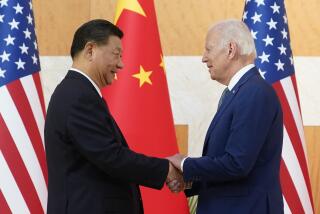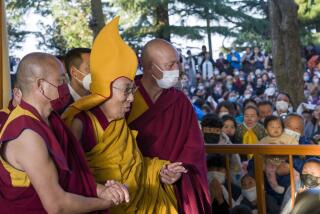White House Puts Out Informal Welcome Mat for the Dalai Lama
- Share via
WASHINGTON — President Bush opened his White House on Wednesday to the Dalai Lama--and to the possibility of new strains on the U.S. relationship with China.
The Bush administration took pains to play down the visit, stressing that the Tibetan leader was welcomed as a spiritual figure and not as a government official.
But even before the Dalai Lama arrived at the White House, officials in Beijing were denouncing the visit, saying it interfered with China’s internal affairs. Wednesday marked the 50th anniversary of the treaty that led to Chinese rule over Tibet. The Dalai Lama, the Tibetans’ political as well as religious leader, is seeking self-rule but not independence for his people.
Bush and his visitor met in the Yellow Oval Room, a living room upstairs in the White House residence, rather than the more formal and official setting of the Oval Office.
By holding the approximately 20-minute meeting away from the president’s office--and directing the Dalai Lama, a Buddhist monk, to use the South Portico entrance to the White House, out of sight of reporters and cameras--the administration sought to avoid irritating China.
Immediately after the meeting, White House Press Secretary Ari Fleischer issued a written statement in which he said Bush “commended the Dalai Lama’s commitment to nonviolence and declared his strong support for the Dalai Lama’s tireless efforts to initiate a dialogue with the Chinese government.”
“The president said he would seek ways to encourage dialogue and expressed his hope that the Chinese government would respond favorably,” Fleischer said. “The president also reiterated the strong commitment of the United States to support the preservation of Tibet’s unique religious, cultural and linguistic identity and the protection of the human rights of all Tibetans.”
His statement echoed remarks made by White House officials when the Tibetan leader met with President Clinton in a similarly informal setting. The Dalai Lama was most recently at the White House last summer.
For his part, the Dalai Lama sought to ease any tensions the visit might cause, saying that Bush “continues to believe that we can work with China on issues where we have agreement, such as trade.”
Speaking with reporters after the meeting, the Dalai Lama, who won the Nobel Peace Prize in 1989, said he and Bush focused primarily on Tibet and U.S. relations with China. He said good U.S. economic ties with China would be “a major benefit.” He did not elaborate.
He said Bush agreed to relay to China’s leadership the Dalai Lama’s assertion that he was seeking limited self-rule for Tibet. China portrays the Dalai Lama, who fled Tibet for India in 1959, as the leader of an independence movement. Bush is likely to meet with Chinese President Jiang Zemin in October during a visit to Shanghai and Beijing.
Emphasizing the administration’s efforts to not irk China, a White House official who requested anonymity said the session was “a private meeting with a Nobel laureate and world-renowned spiritual leader. . . . There’s no inclination to send any signal to the Chinese.”
John Ackerly, the president of the International Campaign for Tibet, added up several elements of the Dalai Lama’s reception in Washington and said they reflect a particularly warm start to the Tibetan’s relationship with the new administration.
Ackerly noted that Wednesday’s meeting was presented by the White House as a session with the president; during the Clinton administration, the Dalai Lama met with officials in the White House and the president would drop by.
In addition, he said, the Dalai Lama was received by Secretary of State Colin L. Powell at his office on Tuesday, and the administration has named an undersecretary of State, Paula Dobriansky, as the special coordinator for Tibetan affairs.
“These are all good signs by the Bush administration,” Ackerly said.
Now, he said, Bush’s challenge is to continue to show support for Tibet without letting Beijing portray such moves as signs of an anti-China policy.
More to Read
Sign up for Essential California
The most important California stories and recommendations in your inbox every morning.
You may occasionally receive promotional content from the Los Angeles Times.













